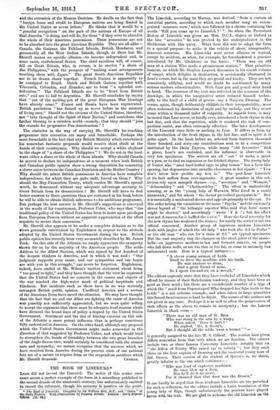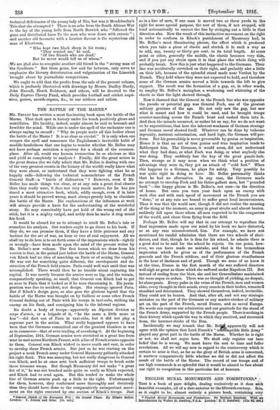THE BOOK OF LIMERICKS.* LEAD. did not invent the Limerick.
The writer of this notice once came across a perfect example of the form in a miscellany published in the second decade of the nineteenth century, but unfortunately omitted to record the reference, though his memory is positive on the point.
• The Book of Limericks. Compiled by Sir William Bull, M.P., and " Orion " of the Daily Express. WW1 Illustrations by Famous Artists. London : Daily Express Offices. [Is. Od.1 The Limerick, according to Murray, was derived " from a custom at convivial parties, according to which each member sang an extem- porized `nonsense verse,' which was followed by a chorus containing the words ' Will you come up to Limerick ? ' " So when the Protestant Bishop of Limerick was given an Hon. D.C.L. degree at Oxford in the late " seventies " he was greeted by the undergraduates in the Sheldonian with this query. What Lear did was to adapt the form to a special purpose—to make it the vehicle of sheer, irresponsible, innocent nonsense. His Limericks were never allusive or topical, except by accident, as when, for example, he foreshadowed a practice introduced by Mr. Gladstone in the lines : " There was an old man at a station Who made a promiscuous oration." That primitive humour, on which Mr. Stephen Leareek discourses in his recent volume of essays, which delights in destruction, is occasionally illustrated in Lear's versos, but in the main they are genial and kindly. They are not consciously edifying, and would no doubt be condemned by many serious modern educationalists. With Lear pen and pencil went hand in hand. The nonsense of the text was reflected in the nonsense of the drawings, in which the imaginative artist reduced himself techni- cally to the level of a child of genius—say a Marjorie Fleming. The verses, again, though deliberately childish in their irresponsibility, were often redeemed by distinction of style and by melody, and they never come within a thousand miles of vulgarity. As regards form, it may be noted that Lear never, or hardly ever, introduced a fresh rhyme in the last line, and that the repetition, while it rendered the task of com- position easier, was often extremely effective. The later development of the Limerick owes little or nothing to Lear. It differs in form by the introduction of the fresh rhyme in the last line, and in spirit it is poles apart. In the book before us, selected from fourteen thousand three hundred and sixty-one contributions sent in to a competition instituted by the Daily Express, while many " old favourites " find a place, Lear's are excluded, and his influence is observable in very few specimens. The writers are all " out " to make a point or a pun, or to find an ingenious or far-fetched rhyme. Tho young lady of Venice who " used hard-boiled eggs to play tennis " has a Lear-like opening, but degenerates into metallic cleverness in her riposte : "You don't know how prolific my hen is." Tho post-Lear Limerick at its best suffers from over-ingenuity. A great number in this col- lection rely upon misspelt rhymes—e.g., " scremyss " and " Wemyss," " dolmondoley " and " Cholmondeley." Tho effect is undoubtedly amusing, as in the " young lady of Warwick Who lived in a castle histarwick," and for whom " the doctor prescribed paregarwiek." But it is essentially a mechanical device and appeals primarily to the eye. To this order belong the variations on the name " Psyche" and the extremely clever legend of " the lethargic reporter Who said that hens' names might be shorter," and accordingly " wrote Y & ; but his effort was not A success for it baffled the :radar." Here the fatal necessity for the new rhyme has weakened the stanza; for surely the sorter is not the official concerned. Another group of ingenious modern Limericks deals with jingles of which the old lady " who took the 3.3 to Forfar " or the old man " who ran for a train at 2.2 " are typical specimens. But the vast majority ring the changes on the stock jokes of the music- halls—on :aggressive mothers-in-law and forward minxes, on people who fall down wells, or are too thin or too fat, or come to untimely but unlamented ends. Here is a typical instance :—
" A clever young airman of Leith Tried to steer the machine with his teeth.
He was anxious to shine, And a great friend of mine, So I spent ten-and-six on a wreath."
The editors expressly state that they have excluded all Limericks which offend by reason of their Rabelaisian tendency, and they have been as good as their word ; but there are a considerable number of a type cf which the " maid from Popocatapetl Who dropped her false teeth in the kettle" is a not extreme example, and when taken in large quantities this forced facetiousness is hard to digest. The names of the authors are
not given in any case. Perhaps it is as well to allow the perpetrators. of
such efforts as the above to remain in anonymity ; but the famous Limerick in blank verse- " There was an old man of St. Bees Who was stung in the arm by a weep ; When asked, Does it hurt ? '
He replied, No, it doesn't, But I thought all the while 'twas a hornet' "- is generally assigned to the late W. S. Gilbert. Tho version here given differs somewhat from that with which we aro familiar. The editors include two or throe famous University Limericks—notably that on " the fellow of Trinity Who raised xyz to infinity " ; but they omit those on the boat captain of Downing and the immortal young man of Sid. Sussex. Their version of the student of Queen's is, we think, greatly inferior to the one which continues :—
" Who was fond of explosive machines.
He once blew up a door, But he'll do it no more, For it chanced that that door was the Dean's."
It can hardly be urged that these academic Limericks are too parochial for such a collection, for the editors include a Latin translation of the young lady of Riga, though unfortunately the printers have played havoc with the text. We are glad to welcome the old Limerick on the !technical deficiencies of the young lady of Rio, but was it Mendelssohn's .Trio that she attempted ? There is an echo from the South African War lin the lay of the young belle from North Berwick who " followed the ;guns and distributed buns To the men who were down with enteric " ; 'and another old favourite with a Learian flavour is the mysterious old !man of Khartoum,
" Who kept two black sheep in his room; They remind me,' he said, ' Of two friends who are dead,' But he never would tell us of whom."
1We are glad also to recognize another old friend in the " strong man of !the Syndicate." But these gems, few and far between, only serve to ;emphasize the literary deterioration and vulgarization of the Limerick brought about by journalistic competitions.
We ought to add that the profits from the sale of the present volume,
'which is profusely illustrated with drawings by Messrs. Dudley Hardy, John Hassan, Heath Robinson, and others, will be devoted to the 'Daily Express Cheery Fund, which provides football and cricket iequi- sites, games, mouth-organs, &c., to our soldiers and sailors.































 Previous page
Previous page